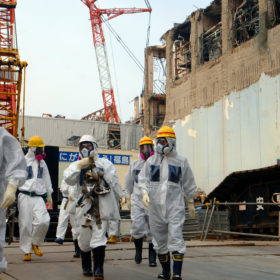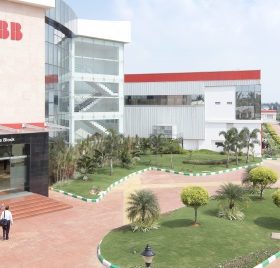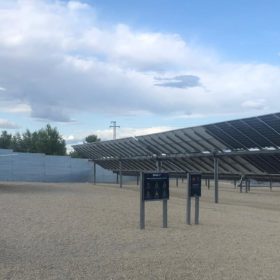IRENA and the UN ink agreement to combat desertification with renewables
A memorandum of understanding signed by the institutions was not solar specific but the use of PV modules for shading, especially in agriculture, can reduce water consumption and help halt the expansion of deserts.
New Japanese environment minister touts end of nuclear power
After Fukushima, Japan’s nuclear power fleet went offline with plans to restart only when safety concerns could be addressed. On his first day at the office, the new environment minister has said he has no intention of ever restarting the reactors. The move could put Shinjiro Koizumi at loggerheads with PM Shinzo Abe, a vocal proponent of nuclear.
The energy transition is easily affordable but all hope of 1.5C warming will vanish in 2028
Technical consultancy DNV GL has published its Energy Transition Outlook 2019. While the electric vehicle, storage and renewable energy industries are likely to see significant rises in demand, the sobering conclusion is the world will miss carbon reduction targets by a long shot.
ABB and Fimer respond to UK criticism of products and customer service
The inverter businesses have responded to the letter published by the UK Solar Trade Association which was critical of the former’s products and customer service record.
Interview: PV Hardware chief operating officer Rodriguez talks heat dust and wind
Emilio J Garcia Rodriguez, from tracker manufacturer PV Hardware, spoke to pv magazine about the company’s activity in the Middle East and North Africa market. Dust, heat and heavy storms complicate the installation and operation of trackers.
Lithuanian energy ministry issues timeline for renewables auctions
The Baltic nation is heavily dependent on energy imports. A plan for energy independence by 2050 foresees the large scale deployment of renewable energy resources.
RES battery prevented complete blackout in the UK
On August 9, a thunderstorm caused 1.5 GW of generation capacity to go offline within seconds in the U.K. The incident caused millions of households to temporarily lose power but the situation could have been considerably worse if not for the country’s battery storage reserves.
The weekend read: PV in need of a new chapter for wind
In part two of this feature on wind resilience in the PV industry, the lack of structural codes comes into focus. Weather events, and wind above all, are the most common causes of failure for PV plants. In the United States, the first steps have been taken to catch up with other industries and a dedicated chapter for PV is set to be included in the next update of the American Society of Civil Engineers code. In Europe, no such plans are in place.
New metallization process cuts silver demand for modules by 30%
Fraunhofer ISE has worked with German technology companies to improve the metallization process in silicon solar cells. The result could drive down module costs quite a bit.
ABB called out by UK Solar Trade Association over quality and customer support
The STA has warned Italian company Fimer, which is set to acquire Swiss company ABB’s inverter business, it will have to honor customer service commitments made to its British members, and voiced fears related to historic quality issues with ABB inverters.









